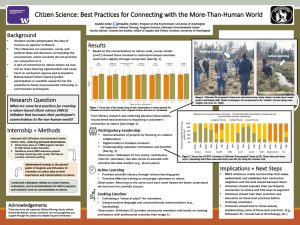Citizen Science: Best Practices for Connecting With the More-Than-Human World
In our western society, many aspects surrounding the environment are rooted in white colonist values where humans are considered superior to nonhuman species and we are taught to treat the environment as an object rather than a living being. Separation from nature – as western society disconnects itself from the rest of the world and spends more time inside – has become an issue as a result. From this, we begin to see a loss in habitat, species, history, and learning opportunities. The purpose of this study was to look at how citizen science programs, specifically nature-based citizen science (NBCS), can help to change these values and (re)connect humans with nature. I worked as an intern for Stillwaters Environmental Center (Stillwaters EC) where I experienced citizen science in action, collecting personal observations. I analyzed results from online surveys I conducted asking NBCS volunteers about their experiences and connectedness to nature. I also evaluated aspects of similar NBCS initiatives to collect evidence to support my results. Findings show that participative leadership where NBCS initiatives focus on engaging the citizen throughout the entirety of the project, active learning where science learning and literacy are prioritized, and evoking emotion in citizens to develop ecological compassion are the main components for creating an NBCS initiative that impacts a participants connectedness to the more-than-human world. These findings promote environmental citizenship and thus contribute to creating a community with strong connections to their environment and motivation to repair the harm we are causing.
